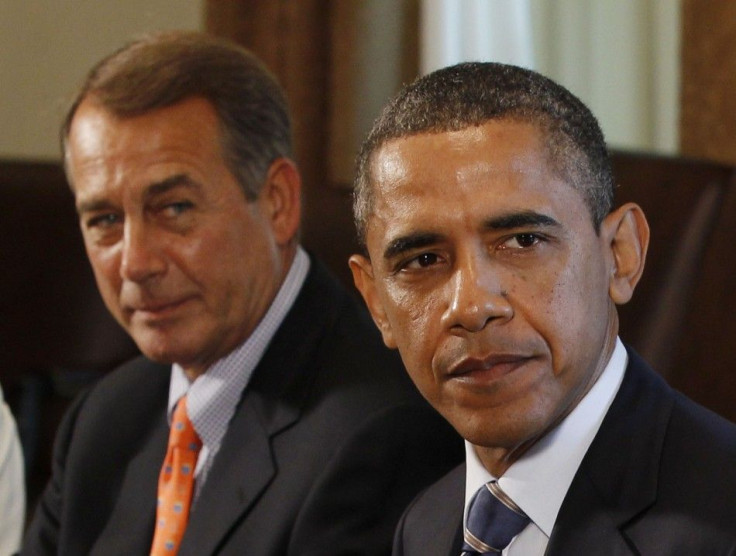Obama, Boehner, Hill Leaders Nearing Debt Deal

Analysis
The nation entered Day 14 of the debt deal crisis on talk that the Obama administration and top Republican Congressional officials were moving closer to deal for a far-reaching, watershed plan that would save $3 trillion over the next 10 years via a mix of substantial cuts to department programs, including health and retirement programs, and with a tax code overhaul.
Moreover, as of early Friday, it appeared the deal will not contain a tax increase, but rather rely on tax code changes, including closing loop holes, for increased revenue -- something that may make the plan acceptable to Republicans opposed to a tax increase, but who don't view a loop hole elimination, or a subsidy change, as a tax increase, The New York Times reported Friday.
Further, both White House officials and GOP leadership were quick to dismiss any assumption that a deal had been reached Thursday: in fact, there was no deal Thursday. That said, the smoke is all around that a deal that would avert the unfathomable -- a U.S. Government default -- is moving closer to becoming a reality.
On Thursday, President Barack Obama spent a portion of his day easing concerns of his party's leaders, and invited key Capitol Hill Democrats to a White House meeting Thursday night that lasted nearly two hours. Participants would not comment afterword, The Washington Post reported Friday.
What's more, both Obama and House Speaker John Boehner, R-Ohio, took pains to maintain deal negotiation confidentiality, in order to prevent any premature discussion that might be counter-productive to the talks, or jeopardize the deal itself.
Reid/McConnell Back-up Plan
That said, Washington, preparation town that is, is also preparing a back-up plan, in the event the big deal, which President Obama calls a grand bargain is not struck between him and House Speaker John Boehner, R-Ohio, or if it doesn't grow out of the Gang of Six legislative package that key Congressional staff are also working on.
That back-up plan would most likely take the form of the McConnell/Reid plan. U.S. Sen. Mitch McConnell, R-Ken., has termed it the last-chance plan, and it would lead to only about $1.7 trillion in savings, but would still avert the universally-dreaded government default.
However, at this stage, given the momentum for a watershed fiscal moment for the nation, a last-chance deal would be a semi-letdown -- kind of like losing the second game of a doubleheader in baseball, 2-1, after your team won the first game 12-2.
Meanwhile, the clock continues to tick toward the August 2 deadline when the U.S. Government runs out of both money and borrowing authority. If the U.S. Government defaults, the nation's credit rating would be downgraded --- rating agency's S&P and Moody's have warned about this -- the U.S. Treasury would not be able to borrow money, and government payments to senior citizens on Social Security and to other payment recipients would likely stop.
On Aug. 4, the U.S. Treasury Department is due to pay off $30 billion in maturing short-term debt. In theory, the United States could prioritize debt payments, but U.S. Treasury Secretary Timothy Geithner warned lawmakers in Congress last week that the prioritization tactic would still cause investors to shun U.S. Treasury securities, commonly known as Treasuries.
Geithner has also repeatedly underscored that failing to raise the debt ceiling will have no constructive outcomes for the nation's fiscal condition, the task of deficit reduction, and U.S. and global stock and bond markets.
In addition, U.S. Federal Reserve Chairman Ben Bernanke, in earlier Capitol Hill testimony -- and in unusually frank terms for a Fed chairman -- underscored that a default would trigger a huge financial calamity, adding that it would send a financial shockwave throughout the global financial system.
Bernanke said U.S. Government bonds are considered the lowest-risk bond investment class in the world, and serve as a benchmark for interest rates for other, more-risky bond and asset classes. If investors can't count on the safety of U.S. debt, they would ask for higher interest on that asset class, pushing up the interest rates on other assets, among other ripple effects, he said.
Others in the Wall Street community said it would not even take a complete government default, just a late interest or principal payment on a tranche of bonds, for investment funds and hedge funds, among other institutional investors, to start pricing higher risk into U.S. Government debt -- something that would ripple through the financial system and send home mortgage interest rates, car loan rates, and credit card rates substantially higher, within hours.
Political/Public Policy Analysis: Cautious optimism remains the operative phrase Friday, with an emphasis on 'cautious.' From the tone of remarks coming from Washington Thursday, it sounds like one or two major points remain before a deal can be announced -- the chief of which being: when the new revenue changes would take affect.
Hence, with the above in mind, the risk barometer, on a scale of 0 to 100 percent, of the likelihood of a U.S. Government default, remained at 20 percent Friday morning, the same as Thursday.
© Copyright IBTimes 2024. All rights reserved.





















